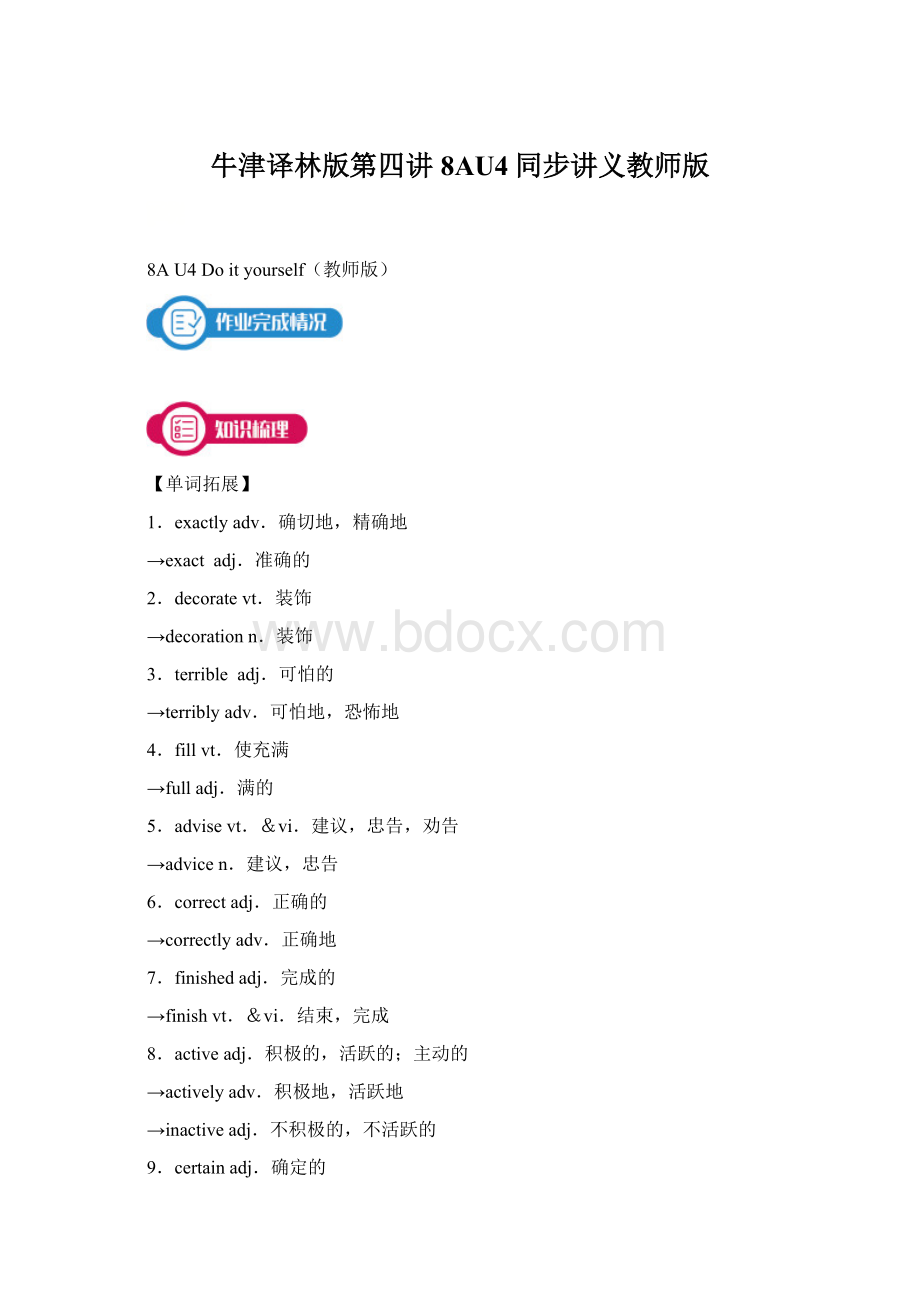牛津译林版第四讲8AU4同步讲义教师版.docx
《牛津译林版第四讲8AU4同步讲义教师版.docx》由会员分享,可在线阅读,更多相关《牛津译林版第四讲8AU4同步讲义教师版.docx(12页珍藏版)》请在冰豆网上搜索。

牛津译林版第四讲8AU4同步讲义教师版
8AU4Doityourself(教师版)
【单词拓展】
1.exactlyadv.确切地,精确地
→exactadj.准确的
2.decoratevt.装饰
→decorationn.装饰
3.terribleadj.可怕的
→terriblyadv.可怕地,恐怖地
4.fillvt.使充满
→fulladj.满的
5.advisevt.&vi.建议,忠告,劝告
→advicen.建议,忠告
6.correctadj.正确的
→correctlyadv.正确地
7.finishedadj.完成的
→finishvt.&vi.结束,完成
8.activeadj.积极的,活跃的;主动的
→activelyadv.积极地,活跃地
→inactiveadj.不积极的,不活跃的
9.certainadj.确定的
→certainlyadv.确定地,当然地
10.possibleadj.可能的
→possiblyadv.可能地
→impossibleadj.不可能的
11.wrongadv.错误地,不对
→wrongadj.错误的
12.covern.封面;盖子,罩
→covervt.覆盖
13.completevt.完成
→completeadj.完成的,完全的
→completelyadv.完全地,彻底地
14.paintn.颜料
→paintvt.油漆,绘画
→paintingn.绘画,油画
【短语归纳】
1.standfor代表
2.insteadof而不是,代替
3.apairofscissors一把剪刀
4.becrazyaboutDIY对DIY着迷
5.putin安装
6.makeamistake犯错误
7.haveapowercut停电
8.filltheroomwithwater使房间充满水
9.putuptheshelf搭起架子
10.advisehimtotakeacourseinDIY建议他上DIY课
11.attendlessons上课
12.cutout裁剪
13.ontheothersideofthecard在卡片的另一面
14.giveup放弃
15.cut…intopieces把……切成碎片
16.makesure确保,务必
17.tidyup收拾妥,整理好
18.keepitsecret保密
19.havefundoingsomething愉快做某事
20.gowrong出差错
【句型分析】
1.Noproblem!
(P42)
noproblem意为“没问题”,这是日常用语,用法如下:
(1)用来回答道歉(主要用于美式英语中),意为“没关系;没什么”。
如:
一Excusemeforsmokinghere.请原谅我在这儿抽烟了。
一Noproblem.没关系。
(2)用来表示同意或愉快地回答请求,意为“没问题;小事一桩”。
如:
一Couldyouposttheletterforme?
请你帮我寄这封信好吗?
一Noproblem.没问题。
(3)用来表示有能力做某事,意为“没问题;不在话下”。
如:
Canyoumakeakite?
你会做风筝吗?
一Noproblem.没问题。
(4)用来回答感谢(主要用于美式英语中),意为“不用谢;别客气;没什么”。
如:
一Thankyouverymuch.非常感谢你。
一Noproblem.没什么。
2.It'spossibletosleepwithallthatnoise.(P51)
句意为:
伴随着所有那样的噪音入睡是可能的。
这里用了句型:
Itis+形容词+todosomething。
句首的it在句中充当形式主语,真正的主语是句中的动词不定式tosleepwithallthatnoise。
如:
ItISpossibletogettherebybus.可以乘公共汽车到那里。
Itispossibletogrowthisflowereveninwinter.
即使在冬天也有可能种植这种花。
Itisimpossibletodrawahorsewithinfiveminutes.
在五分钟之内画好一匹马是不可能的。
possible后面可以接forsomebodytodosomething。
固定结构as…aspossible意为“尽可能地……”。
如:
Willitbepossibleforsomeonetomeetmeatthegateabout9:
30a.m.?
上午九点半左右有人在大门口要见我,可以吗?
Third,youmustmakethehousesasstrongaspossible.
第三,你必须把房子盖得尽可能结实些。
句中的形容词possible意为“可能的”,其反义词impossible,意为“不可能的”。
形容词前加前缀im-,in-,也可以表示相反的意思。
如:
polite礼貌的--impolite不礼貌的
correct正确的--incorrect不正确的
patient耐心的--impatient不耐心的
active积极的一imactive不积极的
complete完成的--incomplete完成的
direct直接的一indirect间接的
3.I'mcertainthatIcanfixitmyself.(P51)
句意为:
我确信我自己能修理。
形容词certain表示“一定;确信”,通常用作表语,后接不定式时,becertaintodosomething表示说话人的看法,意为“一定会;肯定会;有把握做某事”。
如:
Johniscertaintowin.约翰肯定会赢。
Sheiscertaintocome.她一定会来的。
注意,以He’scertaintosucceed.(他一定会成功。
)为
例,句中的becertaintodosomething可作以下转换:
(1)Itiscertainthat+从句。
如:
It’certainthathewillsucceed.他一定会成功。
(2)后接“of+名词(或动名词)”或that/whether从句等,表示句子主语的信念,意为“确信;自信”。
如:
Heiscertainofsuccess.他确信会成功。
He1Scertainthathecansucceed.他确信会成功。
4.Wehadfunworkingtogether.(P52)
句意为:
我们一起工作很高兴。
句中的havefun意为“玩得很愉快”,相当于haveagood/greattime,后接动名词形式,即havefun(in)doingsomething=havea
goodtime(in)doingsomething,意为“做某事很开心”。
如:
Ihadfunplayingbasketballwithmyfriendstoday.
今天我与朋友打篮球,玩得很愉快。
Havefungettingtoknoweachother.
在相互了解对方的过程中玩得开心。
另外,havefunwithsomebody意为“和某人玩得开心”。
如:
Didyouhavefunwithyourpartnertoday?
今天与你的同伴玩得开心吗?
5.ThisisthefirstcardImadeforMum.(P52)
句意为:
这是我给妈妈做的第一张卡片。
句中的ImadeforMum是一个定语从句,修饰先行词thefirstcard·关系代词that在定语从句中充当宾语,所以已经省略。
如:
Youcanchooseanyfood(that)youlike.你可以选择你喜欢的任何食物。
Thisisthemostinterestingbook(that)Ihaveeverread.这是我曾经看过的最有趣的书。
在定语从句中,当先行词前有first,last,next,only,all等修饰语时,关系代词常用that。
如:
Theonlything(that)hedidwastocallthepolice.
他做的唯一的一件事就是给警察打电话。
Thefirstman(that)hementionedyesterdaywasadriver.昨天他提到的第一个人是位司机。
【语法点拨】
祈使句
祈使句是用来表示请求、命令、劝告、建议或叮嘱的句子。
如:
Bequiet,please!
请保持安静!
Don’tbelateagain!
不要再迟到了!
1.祈使句的主语一般是第二人称you,但往往省略。
2.祈使句的肯定形式以动词原形开头,祈使句的末尾用句号或感叹号。
如:
Becareful,oryou’11makemistakes.仔细些,否则你会出错的。
Putonyourcoat,mydearson!
亲爱的儿子,穿上你的大衣!
3.祈使句的否定形式一般是在动词原形前加don’t,构成“Don’t+动词原形+其他”结构。
如:
Don’tbelateforthemeeting!
不要开会迟到!
Don’topenthewindow.It’stoocoldoutside.不要打开窗户,外面太冷。
4.为了显得更为客气和礼貌,常在祈使句中加please。
当please放在句末时,须用逗号与其余部分隔开。
如:
Pleasepassmetheball.请把球传给我。
Openthewindow,please.请把窗户打开。
用should和hadbetter提建议
should和hadbetter都是情态动词,都可以用于给他人提建议,表示“应该”或“最好”做某事。
1.should表“建议”
(1)should意为“应该”,后跟动词原形,没有人称和数的变化,由时间状语或上下文来决定现在、过去或将来。
如:
Youshoulddoyourhomeworkmorecarefully.
你应该更认真地做作业。
Heshouldbebackinthreedays.他应该3天后回来。
(2)should的否定形式是shouldnot或shouldn’t;疑问式是将should提到句子开头;反意疑问部分应为“should/shouldn’t+主语”。
如:
一Youshouldn’tcomeherealoneagain.你不应该再次一个人来这儿。
一Shouldwediscussitatonce?
我们应该马上讨论它吗?
一Yes,youshould.是的,你们应该。
Youshouldn’tmakenoiseinclass,shouldyou?
你们不应该在课堂上大声喧哗,是吗?
2.hadbetter表“建议”
(1)hadbetter可缩写为’dbetter,后跟动词原形,表示现在或将来,没有人称和数的变化。
如:
You’dbettercleanyourroomeveryday.你最好每天都打扫房间。
(2)hadbetter的否定形式是hadbetternot;疑问式是将had放在主语之前;在反意疑问句中,反意疑问部分用“had/hadn’t+主语”。
如:
We’dbetterriotstayathome.我们最好不要待在家里。
You’dbettercometoseeme,hadn’tyou?
你最好来看我,好吗?
练习1
用词的适当形式填空
1.Heoftenmakessome__________(mistake)whenhewritesthelongsentence.
2.wanttomakeabirthdaycardbecausemycousin’sbirthdayis_________(come).
3.Wolvesare______________(active)duringthewinter.
4.Therearemanyfresh___________(grape)ontheplate.Helpyourselves!
练习2
基础练习:
1.一Areyouableto_________(paint)thewholebuilding,Ann?
2.Itisfarfromhere.Youhadbetter___________(take)ataxi.
3.Ittookmoreorlessawholeday___________(clean)theceiling.
4.Don’t___________(sleep)withthewindowsopenincoldwinter.
5.Putupsome___________(color)picturesonLucy’sbedroomwall.
巩固提高:
()1.Don’t_______thepicturesontheblackboard!
A.putonB.putawayC.putupD.putin
()2.Theyneedtwomore_________fortheircomicbooks.
A.shelvesB.shelfC.shelfsD.shelfes
()3.Wouldyouliketopaintthewhitewall_________blue.
A.withB.inC.ofD./
()4.Ikepton_________himthewholeday.
A.callB.calledC.callsD.calling
()5.MrSmithwasillsoIwenttohavethelesson__________.
A.insteadofB.insteadC.inplaceofD.intheplace
()6.Millieiscrazyabout__________kites.
A.makeB.makingC.doD.doing
()7.NotonlyTombutalsoMillie_______donatesomemoneytothechildreninneed.
A.wantB.wantsC.wanttoD.wantsto
()8.一Theboxistooheavytocarry.What’sinit?
1Jack_______itwithmanybooks.
A.filledB.coveredC.usedD.asked
()9.________thisrockmusic,please.I'mafraidsomepeoplecan’tstandthenoise!
A.StoppingB.StopC.StopsD.Stopped
()10.一Oh,Ihadaterribletoothache.
1You’dbetter__________seeadentistandhaveyourbadteethpulledout.
A.togotoB.goingtoC.goestoD.goto
1.Ilikeeating______________(tomato)becausetheyarehealthyforhealth.
2.It’s____________(可能的)forhimtofinishtheworkinanhour.Hedoesn’tdowellinit.
3.The__________(可怕的)typhoonhappenedonacoldwinternight.4.
4.They’velearnedfourEnglishsongs__________(已经).
5.Couldyougivemesome___________(建议)onhowtokeephealthy?
6.Johnwas__________(曾经)inHangzhou.
7.Hefailed_______(pass)thedrivingtestlastweek.
8.Thoughhewasverytired,hekepton_______(work).
9.Ireallyforgethisname_______(complete).
10.Ilookthin,buthelookseven__________(thin)
( )1.He always ________the instructions on the bottle.
A.reads B.looks at C.watches D.sees
( )2.—Can you help me with the bike?
--Sorry , it______, “Do it your self”
A.speaks B.talks C.tells D.says
( )3.---Shall we talk about it in English?
---_______?
Let’s do it right away.
A.Why not B.Will we C.Are you D.Do we
( )4.The sound made the film ________. I am afraid of watching it.
A.terrible B.terribly C.happy D.happily
( )5.You had better_____talk in class without permission.
A.not B.don’t C.no D./
( )6.--- Can I talk to you for a minute, Brian?
--- Sure, I have _______ time.
A a few B little C few D a little
( )7. What bad weather it was!
We decided _____________.
A to go out B not to go out
C to not go out D not going out
( )8.---Is your brother crazy _____ computer games?
--- No, he isn’t.
A of B in C about D at
( )9. I need a tool __________ my bike.
A to repair B repairing C repaired D repair
( )10. 16. Don’t walk__________the rain forest. It’s dangerous.
A.across B.through C.from D.cross
( ) 11. —Would you like to come to our English party?
—Oh, great._____________
A.I’d love to
B. That’s all right
C. I’d like
D. I want very much
( ) 12. My teddy bear is red, so this blue one must be ____.
A. else someone’s B. someone else’s
C. other one’s D. some other’s
( ) 13.Liu Ying is good at singing.She sings__________the famous singer, Coco.
A. as well as B. as good as
C. as better as D. as the best as
( ) 14. He’ll go swimming ___________ having a picnic.
A. instead B. instead of C. but D. of instead
( )15.Mike ______football. He often plays football, watches football and always thinks of football
A. is worried about B. is crazy about
C. is interested in D. is glad to
( )16. I usually _____________Mr. Smith to give up smoking.
A. make B. let C. have D. advise
( )17. When you do DIY,it means you needn’t_______ someone to do it.
A. let B. have C. pay D. make
( )18. Don’t __________for school again, Millie!
A. late B. are late C. is late D.be late
( )19. —Please spen